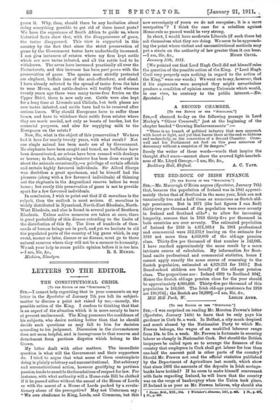LETTERS TO THE EDITOR.
THE CONSTITUTIONAL CRISIS.
[TO THE EDITOR OF THE " SPECTATOR."] Sra,—I cannot help regretting that in your comments on my letter in the Spectator of January 7th you left its subject- matter to discuss a point not raised by me,—namely, the possible action of the King. I confess to thinking that that is an aspect of the situation which it is more seemly to leave at present undiscussed. The King possesses the confidence of his subjects, who desire nothing better than that he should decide such questions as may fall to him for decision according to his judgment. Discussion in the circumstances does not seem helpful, and is incongruous to that reserve and detachment from partisan disputes which belong to the Crown.
My letter dealt with other matters. The immediate question is what will the Government and their supporters do. I tried to argue that what some of them contemplate doing is plainly arbitrary and unconstitutional. But arbitrary and unconstitutional action, however gratifying to partisan passion, tends to unsettle the foundations of respect for law. For instance, with what authority will a Home-rule Bill be clothed if it be passed either without the assent of the House of Lords or with the assent of a House of Lords packed by a revolu- tionary abuse of the prerogative P May not Ulstermen say : " We owe obedience to King, Lords, and Commons, but this new sovereignty of yours we do not recognise ; it is a mere usurpation "? I think the case for a rebellion against Home-rule so passed would be very strong.
In short, I would have moderate Liberals (if such there be) ask themselves what they are doing. We seem to be approach.. ing the point where violent and unconstitutional methods may put a strain on the authority of law greater than it can bear.
[We pointed out that Lord Hugh Cecil did not himself raise the question of the possible action of the King. (" Lord Hugh Cecil very properly says nothing hi regard to the action of the King," were our words.) We went on to say, however, that if his arguments were accepted they might nevertheless produce a condition of opinion among Unionists which would, in our view, be contrary to the public interest —ED. Spectator.)










































 Previous page
Previous page